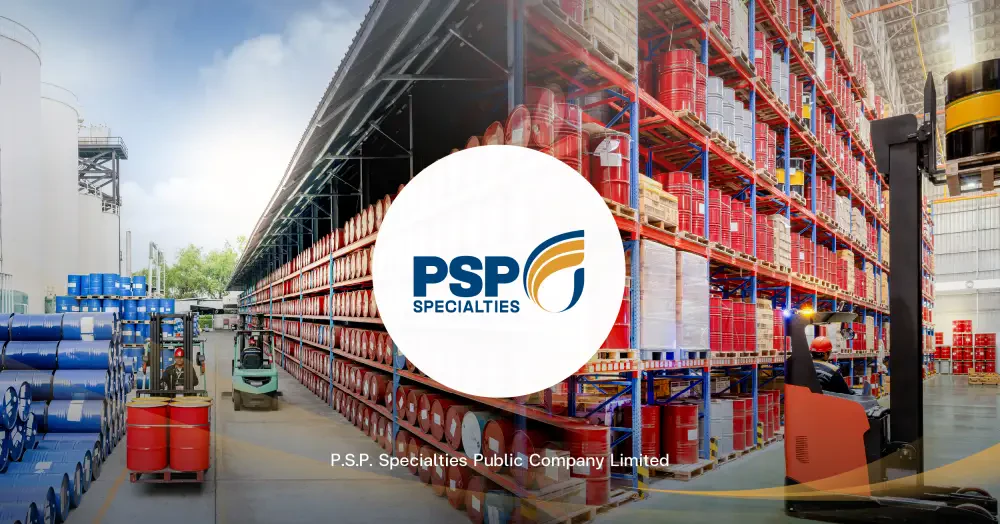PSP reports third-quarter results for 2568, posting a net profit of 210 million baht, an increase of 86%, pushing nine-month profit above target and marking an all-time high for the second consecutive year

P.S.P. Specialties Public Company Limited (PSP), the leading lubricant solutions partner, reported Q3 2025 operating results with revenue of 2,884 million baht and profit of 210 million baht, an 86% increase from the same period of the previous year, while nine-month total revenue reached 9,759 million baht and net profit amounted to 736 million baht, a 48% increase year-on-year. The company’s growth was mainly driven by domestic markets for lubricant products, grease, transformer oil, and rubber process oil, which continued to show steady demand, as well as significantly expanding international markets. PSP also has strategies to create new revenue streams by leveraging expertise and investing in businesses that will further strengthen the company, while advancing efforts toward becoming a sustainable organization.
Mr. Sakesan Krongphanich, Deputy CEO of P.S.P. Specialties Public Company Limited (PSP), revealed that the company reported Q3 2025 operating results to the Stock Exchange of Thailand. The company recorded a net profit of 210 million baht, an increase of 97 million baht or 86% compared to the same period of the previous year, which had a net profit of 113 million baht. The main drivers of this growth were the higher gross profit margin and the expansion of international markets focusing on high-margin products and markets.
For the nine-month operating results in 2025, PSP recorded total revenue of 9,759 million baht and total net profit of 736 million baht, an increase of 238 million baht or 48% compared to the same period of the previous year, which reported net profit of 498 million baht. The nine-month net profit in 2025 also exceeded the full-year net profit of 2024, which was 672 million baht. The company’s main performance growth came from an increase in gross profit from sales of goods and services, expansion into high-margin markets, and more efficient management of raw material and inventory costs. In addition, the company recorded a significant increase in share of profit from associates and joint ventures, as well as reduced financial costs resulting from repayment of loans from financial institutions.
The company’s performance aligns with core strategy of maintaining leadership position in the domestic market while accelerating international market expansion to increase PSP’s proportion of sales and revenue from overseas. Currently, PSP exports lubricant products accounting for more than 20% of total revenue to over 40 countries across 5 continents. In 2024, the company expanded into Japan, European countries, African countries, and North America. For this year, PSP is pursuing a strategy of maintaining existing export markets while simultaneously expanding into new markets to support continuous growth in international markets.
“In the third quarter of this year, the global economy continued to be affected by volatility in trade and energy prices, particularly the rising cost of international transportation driven by import tariffs and port fees in many countries. Meanwhile, global oil prices continued to fluctuate based on geopolitical factors and oil demand in various regions. However, although these situations did not have a direct impact on the company, PSP has closely monitored the developments and trends in order to assess opportunities for market expansion and to prepare for shifts in the global supply chain.”
“In addition to core business, which remains the main source of revenue, PSP is also seeking opportunities to create new income streams that align with sustainable growth objectives. For example, in the first quarter of this year, we launched ‘PSP Laboratory Service’ to provide research, development, and quality control testing for lubricant products. This is a new service from PSP that builds on our long-standing expertise in research, development, quality control, and the production of high-quality lubricants. In the third quarter, we acquired the remaining shares of Recycle Engineering Co., Ltd. (RE), a specialist in chemical recycling, resulting in PSP holding 100% of RE, with the aim of supporting the growth of our core business into a sustainable enterprise. Additionally, we entered into a joint venture with partners experienced in the service industry to establish Uplix Co., Ltd., a company providing safety, occupational health, and environmental training services, covering the sale, rental, installation, inspection, and maintenance of safety equipment. This initiative is intended to create new growth driven by the strengths we have cultivated for more than 35 years,” said Mr. Sakesan.
In the fourth quarter of 2025, PSP continues to pursue proactive operational plans, focusing on maintaining and expanding domestic customer base, which is a key market, while accelerating efforts to penetrate additional international markets through increased sales and marketing activities in each country. The company is also working to build brand awareness and strengthen PSP’s credibility at the global level, with the goal of driving growth alongside advancing transition toward a sustainable business in alignment with 2025 ESG-focused business plan.
“In the first nine months of 2025, our performance has grown strongly in line with our plans, with nine-month profit exceeding the full-year profit of last year. This means that the company will achieve highest profit since establishment for the second consecutive year. We aim to continue growing through three core strategies: (1) becoming a sustainable leader by increasing the proportion of revenue from international customers, (2) creating new growth from our existing strengths, including eco-friendly products and high-value products that meet future demand, and (3) developing new business opportunities through strategic partnerships. Most importantly, we operate our business in accordance with our goals and sustainability principles in all dimensions. We aim to reduce greenhouse gas emissions to Net Zero by 2050, in order to become a truly sustainable leader in this industry,” Mr. Sakesan concluded.

